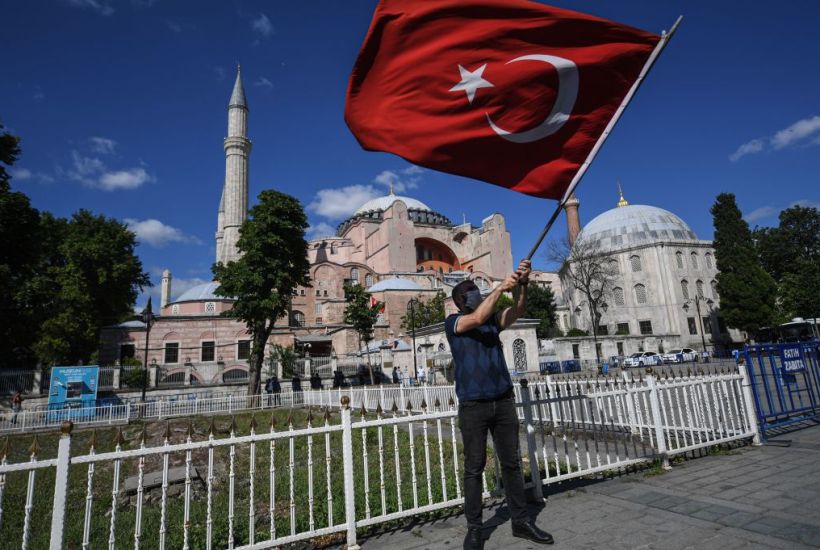Turkey’s strongman president Recep Tayyip Erdogan has announced that the Byzantine church of Hagia Sophia will become a mosque again, after 85 years as a museum and a designated Unesco World Heritage site. It will be the fifth church of the same name — all once symbols of the Eastern Roman Empire and priceless cultural treasures — to face the same fate in recent years.
Erdogan is facing political threats, from old allies like former prime minister Ahmet Davutoğlu, and from Turkey’s poor economy. He will be hoping that this radical move consolidates his support. It is not certain that it will work. Berk Esen, international relations professor at Ankara’s Bilkent university, said that ‘if it is finally turned into a mosque, it’s going to be seen as a victory for Erdogan and the Islamist movement… But I don’t think Erdogan will be able to expand his voter base.’
But we must look beyond Turkey’s domestic troubles and raw sentiment with a cool head, because, above all, the move signals what might prove to be era-defining shifts, right on Europe’s borders. The target is not simply domestic. In the same breath as he means to placate his followers, Erdogan takes aim at geopolitical opponents in the West and the East.
When Kemal Ataturk, the founder of contemporary Turkey, turned the Hagia Sophia into a museum in 1934, he hoped to mark the end of Islam’s primacy in public life, as it was in the Ottoman years. This would be a new, secular state. It was also meant to be a gesture of good will towards Greece, with whom Turkey fought a bloody war a decade earlier that ended in ethnic cleansing and genocidal acts against Christians. It is here that Erdogan’s revisionist vision manifests, and where his greatest provocation lies.
With Turkey leaving secularism behind, Erdogan is positioning himself to lead what he sees as a resurgent Islam, with Turkey at its head as a civilisation state. He wants Turkey to become a beacon that calls to Muslims all over the world, and places himself as their protector. It is no accident that the announcement came at the same time as the anniversary of the 1995 Srebrenica massacre. Note the loaded language that Turkey’s defence ministry used in its announcement on the anniversary date:
‘We commemorate the #Srebrenica martyrs who were massacred by criminals in the middle of Europe 25 years ago and share the pain of the people of Bosnia and Herzegovina’.
What jihadis are trying to do with guns and bombs — to eliminate the space for co-existence by creating fault-lines within multicultural societies — Erdogan is trying to do with a new paint job.
It has certainly provoked a strong reaction. Metropolitan Hilarion of Volokolamsk, an Orthodox bishop, said the move is ‘a slap in the face that the Turkish leadership has inflicted on the Orthodox Church, with the whole Christian world’.
But Erdogan’s neo-Ottoman vision doesn’t end with soft power. The Turkish army is now engaged not only in Syria, but also in Libya (essentially against a coalition of countries that include Greece, France, Cyprus, Egypt and Turkey’s regional antagonist, Saudi Arabia), while the Turkish navy is spread out from the Black Sea to eastern Africa and all the way to Qatar.
There are constant and numerous airspace violations by Turkish fighter jets, while Greece was infuriated by a maritime boundary treaty signed between Turkey and the Libyan Government of National Accord which establishes an exclusive economic zone between them, in the Mediterranean Sea. Greece regards the deal as ‘void’ and ‘geographically absurd’, as it ignores the presence of several Greek islands between the Turkish and Libyan coasts.
In this context, the abandonment of Ataturk’s legacy is also a direct challenge to the treaty of Versailles, which Erdogan has spoken of many times as disgraceful for Turkey. His revisionist worldview would seek to overturn it, and open up Turkey’s sea borders deeper into the Aegean.
Erdogan’s firm friendship with Donald Trump has so far protected him from worse sanctions and responses by European leaders. Will the Hagia Sophia be a wake-up call to a West that has so far tolerated far too many transgressions? Does it even care? The time for complacency is over.
Got something to add? Join the discussion and comment below.
Get 10 issues for just $10
Subscribe to The Spectator Australia today for the next 10 magazine issues, plus full online access, for just $10.




















Comments
Don't miss out
Join the conversation with other Spectator Australia readers. Subscribe to leave a comment.
SUBSCRIBEAlready a subscriber? Log in